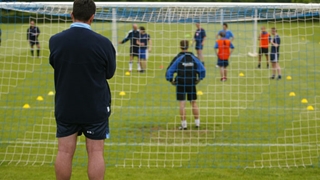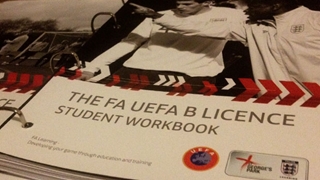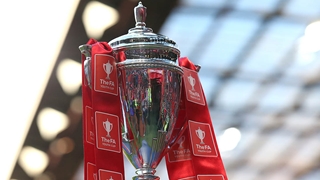
There are a variety of practices within the UEFA B Licence course
We take a look at the different coaching practice definitions used on The FA UEFA B Coaching Licence course...
Pattern Practice
- A practice within which the movements of the players and ball tactically appropriate and pre-determined.
- The players involved adopt positions and roles relevant to their game function and perform chosen elements of their role as are required within the practice.
- Opposition may be incorporated within certain aspects of the practice if/as required.
Wave Practice
- A two-directional practice, involving a minimum of thee groups of players. The practice can range from un opposed to opposed, based on demand.
- Groups are arranged within the practice to ensure the continuous repetition of both attacking and defending functions.
Advanced Technical Practice
- A technical practice designed specifically to introduce new and innovative technical elements
Or
- A practice to enhance and extend existing technical competencies relating to playing positions, roles, responsibilities and operational circumstances.
Squad Practice
- Any practice designed to accommodate the needs of a squad of players within which the capacity exists to focus on either a single technical / tactical aspect or a range of aspects specific to individual roles and responsibilities.
- A practice designed to address the needs of a playing squad that focuses on either technical or tactical aspects of play, and is relevant to positional roles and responsibilities or the required style of play.
Skill Practice
- This is an opposed practice with the emphasis on developing the bond of technique and decision-making. The practice contains objectives for all players that are derived from the technical theme being practised. Appropriate areas, the number of players involved and imposed 'conditions' will vary around the skill theme for development.
Functional Practice
- This is a practice situation in which a player or a small group of players develop an understanding of their attacking and/or defending roles, responsibilities and accompanying skills. Practice will be best sited in the area of the field where the player operates in a game and only players who are primary or secondary in the development of role understanding at involved in the practice.
Small-Sided Game
- A directional game-practice situation involving goalkeepers playing in teams of less than eleven-a-side. It can be utilised for the coach to work technically or tactically and is ideal for developing the principles of play and team understanding. Working areas are adapted to suit the reduced numbers of players and official game rules are applied, although some may be modified. The coach will usually work with one team and on one theme of work.
Phase of Play
- This is a practice situation utilising the full width of the pitch but with reduced length, it involves team units of players attacking or defending against opponents and is ideal for developing group, unit and team tactical understanding.






